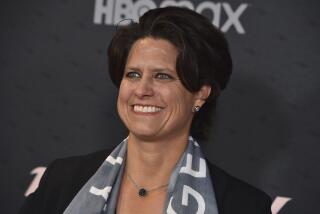Dating sites Jdate and Christian Mingle to pay restitution to customers
- Share via
The parent company of niche dating sites Jdate and Christian Mingle has agreed to pay $500,000 in penalties and up to $985,000 in restitution to customers whose subscriptions automatically renewed or who were denied refunds.
Los Angeles-based Spark Networks USA also agreed to change its website and sales practices to better protect consumers after being sued by the Santa Monica city attorney and district attorneys in San Diego, Los Angeles, Santa Clara and Santa Cruz counties.
The judgment was signed by a Los Angeles County Superior Court judge Oct. 3.
The consumer protection action was pursued against the company after prosecutors learned that Spark dating sites were automatically renewing customer payments without their express prior consent, which is required under federal and state law.
“Consumers always have the right to know where their money is going and companies must comply with California’s laws in order to ensure that consumers understand certain transactions will renew automatically,” San Diego County Dist. Atty. Summer Stephan said in a statement Monday. “This joint effort is a great example of how our Consumer Protection Unit works to protect people from unfair business practices in the marketplace and ensure that California’s consumer protection laws are followed.”
The final court judgment, filed in Santa Monica, was negotiated between the company and a task force of prosecutors, with the Santa Monica city attorney’s office acting as lead counsel.
The $500,000 in civil penalties will be shared equally among all agencies, a statement from Stephan’s office said.
The judgment requires all of Spark’s dating websites to have full transparency with consumers about automatically renewing memberships. It specifies the company will clearly and conspicuously disclose renewal terms and obtain consumers’ consent through a separate check box or similar mechanism that does not include other terms and conditions.
The company also must send a clear summary of its renewal terms to consumers after they pay, and the company must allow consumers to cancel easily, according to the release.
Federal and state law requires businesses to make auto-renewals clear to consumers and to get “express, affirmative consent” before any money is collected.
The judgment said California consumers who paid certain membership fees between May 26, 2012, and Oct. 10, 2017, would be able to seek reimbursement if they were charged for at least one automatically renewed cycle without their knowledge and consent. Customers who previously requested cancellation of an automatic renewal or continuous service plan and were denied were also eligible for restitution.
Each eligible recipient would receive a restitution check for $25 unless the total restitution claimed would exceed $985,000. If that happens, the per-person amount would be reduced, the settlement said.
karen.kucher@latimes.com
More to Read
Sign up for Essential California
The most important California stories and recommendations in your inbox every morning.
You may occasionally receive promotional content from the Los Angeles Times.













